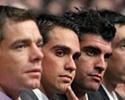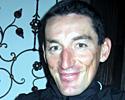First Edition Cycling News for October 26, 2007Edited by Ben Abrahams, with assistance from Susan Westemeyer Evans welcomes scrapped time bonusesBy Hedwig Kröner in Paris
Although the glamorous Tour de France presentation at the Palais des Congrčs in Paris on Thursday unveiled a rather unpretentious 2008 race course, it also brought about some surprises. In his speech, Tour director Christian Prudhomme used only one sentence to announce that next year's event would not see any time bonuses – neither during the stages nor at the finishes – yet, this little detail could make a huge difference in the outcome of the Grande Boucle. As this year's runner-up Cadel Evans put it, if this change to the rule book would have taken place before the 2007 edition, the Australian would have had the better of Alberto Contador, who beat him only by a few seconds. Asked what his first impression of the 2008 route was, the Australian told Cyclingnews, "Normally Contador takes time on the climbs and I take time in the time trials. There's the same amount of climbing but less time trials next year, so normally it would play in his favour. If he didn't have time bonuses from the Tour this year, I think I would have won the Tour..." Still, Evans was in good spirits when he remarked that the scrapped time bonuses would make the competition somewhat tighter, with many potential attackers seizing their opportunities to go for the yellow jersey. "It'll be interesting to see how the race unfolds without the time bonuses," the Predictor-Lotto stage race captain continued. "In the first week it will change the race dynamics a little bit, and the way the riders race. It might make the race closer, which is probably what the organisers want: a closer, more exciting race. This year, people thought it was an exciting race with such a close finale, so maybe they want more of that." Indeed, not only the abolition of bonus seconds might open up the road for a larger amount of possible Tour winners, also the overall choice of roads, climbs and time trial kilometres could make the 2008 Tour de France a very different one from those last few editions when a irreplaceable American dominated the event. There may be four mountain summit finishes as usual, but one of them cannot be regarded as very difficult – the stage to Super Besse – and there are never more than three climbs of high category in one stage. What's more, with only 82 kilometres against the clock, the old equation of 'the best time trial and climbing capabilities make a Tour winner' might not be as easily calculated as before. We shall see, next July. More TdF route reactionsBy Gregor Brown in Paris Quick.Step team manager Patrick Lefevere "Everyone always talks about doping in our sport but I think that the traffic of the post and pre-stages makes life very difficult. I think if you drive one hour in the evening after the stage and one hour in the morning before... with highways, it is no problem, but when you arrive at 8.00 or 8:30 a few times, we arrived at 9:00 in the evening... it is not good. "The lack of transfers is a good thing for my riders. I know the Tour's organisers cannot make the stage any less harder. Maybe the discussion of reducing the length of the Tour [less than three weeks - ed.] should be discussed in the future. When you see 10 flat stages in a row with the same finish everyday... I don't think if you go from 21 days to 18 that it would change the race." On the possibility of Tom Boonen winning less stages: "Well, sometimes less is more. If there are less stages and you win one of them it gives you more publicity. The next days my team will be meeting, but it will not be very serious, only to be together. We will teach the foreigners how to drink beer." Liquigas team manager Roberto Amadio "It will be a great course; right from the start, it will be challenging. The stages are distributed well. There are the arrivals that could definitely decide the Tour." On the lack of transfers: "This is something that is important for the riders to recover. It is always important that we are working to improve the riders' conditions." On the removal of time bonuses: "It will not be important. For them [Filippo Pozzato and Daniele Bennati] the first thing is to win a stage. The bonuses are important for the maillot jaune, but above all the stage win is important." On Danilo Di Luca's status with the team: "He is no longer with Liquigas for 2008 officially." Saunier Duval team manager Joxean Matxin "For the riders it is perfetto. When there are fewer transfers it is a better Tour de France, and becomes more comfortable for the riders, the personnel... less stressful. There have been some transfers in the past in airplanes, or the Giro d'Italia this year, it was a big show [from Sardinia to Naples - ed.]. "I hope for a mythical Tour with the Alpe d'Huez and Hautacam. These climbs mark the Tour de France. The Alpe d'Huez – the word means 'Tour de France.'" On Iban Mayo's B sample test result for EPO: "There is news that the test results came back negative and there is news that the labs want to do another analysis, and the UCI has talked about taking the case to CAS [Court of Arbitration for Sport]. We have only heard from the Spanish Federation, it communicated the two negatives from the Gent laboratories, and from the journalists. "We have to obtain an official response from the UCI, and then we can allow him to race again. Once we know something, we can make a decision, keeping in mind that he still has a year of contract remaining with Saunier Duval." Sinkewitz unlikely to pay back salaryFormer T-Mobile rider Patrik Sinkewitz who tested positive for testosterone at this year's Tour de France, is unlikely to pay back the equivalent of his annual salary as required by the UCI's 'Commitment to a new cycling', according to his attorney Michael Lehner. Sinkewitz was reportedly paid 700,000 euro a year by T-Mobile, but Lehner told German press agency dpa that the UCI's document was questionably legal and "not worth the paper it is written on". He did not believe that T-Mobile would request the money back, saying "so far there is no sign of that". T-Mobile did not seem alarmed by Thursday's statements from Sinkewitz, in which he reportedly told the German cycling federation about how certain team doctors organised and administered doping products during his career. "We have known ever since Jan Ullrich [that team riders doped in 2006]," said Christian Frommert, Head of Sponsoring Communication for T-Mobile's parent company Deutsche Telekom. "This just shows the brazenness of some riders and shows the need for our new concept, with which we also have to count on such blows." Team manager Rolf Aldag added: "I don't know of any official Sinkewitz explanation of doping practices at T-Mobile in 2006. If that exists, then certainly we will react to it." Marco Pinotti: Engineering a new path
Marco Pinotti is widely respected in the peloton as being a clean and fair cyclist, and when he found himself in the leader's jersey of his home tour earlier this year he received accolades from afar. Gregor Brown of Cyclingnews sat down with the Italian to catch up during the recent World Championships to discuss his maturation in the cycling world and his 2008 plans. Marco Pinotti waved the flag of Team T-Mobile's anti-doping stance high when he took the maglia rosa of overall leader during this year's Giro d'Italia. The Germany-based team had completely reorganized its structure over the previous winter, dropping a lot of riders from its ranks and adding in riders it believed were role-models for its new stance, like the 31 year-old from Bergamo. While finishing his degree in Management Engineering at the University of Bergamo, l'ingegner Pinotti started his cycling career as a stagiaire with Team Polti in 1998. Classmate and friend Matteo Algeri, currently a directeur sportif with Saunier Duval, encouraged his continuation, and in 1999 he started his first of six years with Italian Team Lampre. "It has been a maturation and personal development process," stated Pinotti to Cyclingnews at the bar of the Relaxa Hotel in Stuttgart. A light drizzle came down outside as he fondly reflected back over his years at Lampre (1999-2004), Saunier Duval (2005-2006) and T-Mobile. "When I turned pro it was with Lampre, which is an Italian team, close to where I live. They had a technical director that was good in developing young riders. I was lucky to find a good environment to develop as a rider, even if I did not have good luck with injuries," he continued. He had two major setbacks while riding in the blue and pink colours of Lampre. "I was not lucky with the operation in my left arm, I was out almost a year and a half. I crashed in the fall of 2000, I raced in 2001, but then the problem came back again at the end of 2001. So then I lost time again in 2002. In 2003 I started again, but I broke my pelvis and I lost half my season. For two years, 2002 and 2003, I only did a few races. 2004 I finally had a full season." To read the full interview with Marco Pinotti, click here. Wiesenhof leaves with best ranking everTeam Wiesenhof-Felt has gone out with a bang, finishing its final season of existence as the fourth best team in the UCI Europe Tour, the best result the team has ever had. Stefan van Dijk echoed the team's success by finishing fourth in the riders' ranking. "When you think that we had more wildcard invitations to ProTour races than any other Professional Continental team, and therefore couldn't always send our best riders to the Europe Tour races, then that is a good result for our work," said team manager Raphael Schweda. "On the one hand, that caused us to lose a lot of points, but on the other hand, we had some great moments at the ProTour races, which we will never forget." Wiesenhof announced in May that it would end its sponsorship at the end of this year. Schweda announced earlier this month that he had not been able to find a new sponsor and would not apply for a new license for the coming season. Slipstream opens team launch to the publicTeam Slipstream/Chipotle has taken the unusual step of opening its 2008 team launch to the public, with a limited number of tickets available for the event on Wednesday, November 14 at the Boulder Theater in Boulder, Colorado. The event will include a screening of the pilot episode for the team's reality TV show, which will potentially air this year, a short film highlighting the team's history, and a film showcasing the tumultuous career of new signing David Millar. Fans will have the opportunity to pose questions during an open Q&A forum with riders, followed by an auction with contributions from Millar and fellow Slipstream newcomer David Zabriskie. Additional auction items include a 2008 team edition Felt F1 bike, a Zipp 808 wheelset, and best of all, a year's free burritos from co-sponsor Chipotle. General admission tickets cost $25 and can be purchased online at www.slipstreamsports.com. All proceeds from the event will benefit the Davis Phinney Foundation, an organisation dedicated to research into Parkinson's disease.
(All rights reserved/Copyright Future Publishing (Overseas) Limited 2007) |

|
January 2009 |
Recently on Cyclingnews.com |


